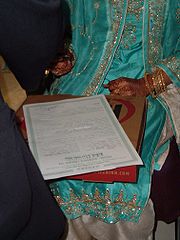
Islamic Marriage Contract
Encyclopedia


Witnessing
In Sunni Islam, a marriage contract must have two male witnesses, or, in the HanafiHanafi
The Hanafi school is one of the four Madhhab in jurisprudence within Sunni Islam. The Hanafi madhhab is named after the Persian scholar Abu Hanifa an-Nu‘man ibn Thābit , a Tabi‘i whose legal views were preserved primarily by his two most important disciples, Abu Yusuf and Muhammad al-Shaybani...
school of jurisprudence, one man and two women. Proper witnessing is critical to the validation of the marriage, also acting as a protection against suspicions of adulterous relationships. The importance of this is demonstrated in a narration in which a case was brought to Umar
Umar
`Umar ibn al-Khattāb c. 2 November , was a leading companion and adviser to the Islamic prophet Muhammad who later became the second Muslim Caliph after Muhammad's death....
concerning a marriage which had been witnessed by only one man and one woman; he responded: "This is a secret marriage and I do not permit it. Had I been the first to come upon it, I would have ordered them to be stoned."
In Shia Islam, witnesses to a marriage are deemed unnecessary. Shia belief is that while the Qur'an
Qur'an
The Quran , also transliterated Qur'an, Koran, Alcoran, Qur’ān, Coran, Kuran, and al-Qur’ān, is the central religious text of Islam, which Muslims consider the verbatim word of God . It is regarded widely as the finest piece of literature in the Arabic language...
requires two witnesses for Talaq
Divorce (Islamic)
In Islam there are separate rules for divorce for men and women under the terms of Islamic law . When a man has initiated a divorce the procedure is called . When a woman has initiated a divorce it is called khula ....
, it makes no mention of similar requirements for marriage. It is also believed that, as Nikah Mut'ah (a type of contract which had further relaxed requirements) was prohibited in Sunni Islam, the necessity of witnessing was introduced by Sunni caliphs, specifically Umar
Umar
`Umar ibn al-Khattāb c. 2 November , was a leading companion and adviser to the Islamic prophet Muhammad who later became the second Muslim Caliph after Muhammad's death....
, to ensure that no couples engaged in it.
Type and content
While it is customary for marriage contracts to be written down, particularly when the bride and groom wish to make any stipulations, classical jurists required only oral offer and acceptance for the contract's validity.Among the stipulations that can be included in the contract include giving up, or demanding, certain responsibilities. The contract may also be used to regulate the couple's physical relationship, if needed.
The marriage contract can also specify where the couple will live, whether or not the first wife will allow the husband to take a second wife without her consent, whether or not the wife has the right to initiate divorce, and other such matters. The marriage contract somewhat resembles the marriage settlements once negotiated for upper-class Western brides, but can extend to non-financial matters usually ignored by marriage settlements or pre-nuptial agreements.
Purposes
One important purpose of the contract is that which makes sexual intercourse legalFiqh
Fiqh is Islamic jurisprudence. Fiqh is an expansion of the code of conduct expounded in the Quran, often supplemented by tradition and implemented by the rulings and interpretations of Islamic jurists....
. This is supported by various Hadith
Hadith
The term Hadīth is used to denote a saying or an act or tacit approval or criticism ascribed either validly or invalidly to the Islamic prophet Muhammad....
s and quotations:
Sahih Bukhari
Sahih Bukhari
Ṣaḥīḥ al-Bukhārī , as it is commonly referred to, is one of the six canonical hadith collections of Islam. These prophetic traditions, or hadith, were collected by the Persian Muslim scholar Muhammad ibn Ismail al-Bukhari, after being transmitted orally for generations. Muslims view this as one of...
, Book 62, #81:
- Narrated 'Uqba: The Prophet said: "The stipulations [in the marriage contract] most entitled to be abided by are those with which you are given the right to enjoy the (women's) private parts."
Al-Mughni (by Ibn Qudaamah), Kitab al Nikah:
- ... the Prophet [said]: "The most deserving of conditions to be fulfilled are those by means of which sexual intercourse becomes permissible for you."

